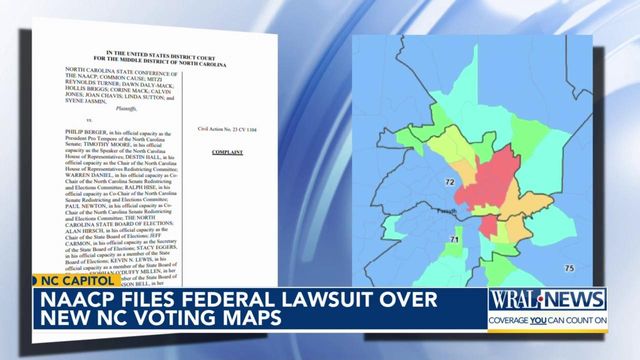NAACP sues over new NC political districts, saying they're racially gerrymandered
A new federal lawsuit filed Tuesday by the NAACP accuses Republican state lawmakers of drawing new political districts in a way that artificially inflates the political power of white voters at the expense of Black voters. It’s the third such racial gerrymandering lawsuit filed in recent weeks.
It’s also the most wide-ranging legal action against North Carolina's newly redrawn voting maps. It challenges new U.S. House of Representatives districts, as well as new districts for state House and Senate seats. Previous lawsuits only focused on some of those maps.
About one in every four North Carolinians is Black or multiracial. And in North Carolina, like elsewhere, nearly all Black voters support the Democratic Party. And about 90% of Republican voters are white. So Republicans can cement themselves in power, the lawsuit says, by discriminating against Black voters and using the new maps to diminish their political influence.
The lawsuit focuses on specific areas that it claims have now been racially gerrymandered, both urban and rural — ranging from the "Black Belt" area of rural northeastern North Carolina to districts in and around Charlotte, Greensboro, Wilmington and other metro areas with sizable Black populations.
"There are people determined to make sure that Black votes are discounted,” said Deborah Maxwell, president of the North Carolina State Conference of the NAACP, during a press briefing Tuesday. “... Every vote should be equally weighted and not determined just because of your color within this state or any state within this country.”
The complaint comes days after the end of candidate filing for the 2024 elections. With little time left until the primary elections in March, it’s unclear if it will succeed in securing an emergency court order to block the maps immediately. The lawsuit appears to acknowledge the time constraints, asking for a court to order new maps to be used at least by the 2026 elections, if not 2024.
Republicans are in charge of drawing the maps because the party controls the state legislature. They approved the new maps in October. A recent ruling from the North Carolina Supreme Court allows the party in control of the map-drawing process to use partisan data to craft districts that are politically advantageous. But federal law and legal precedent still bans racial gerrymandering.
GOP leaders have frequently denied that the new maps intentionally target Black voters. They've said they drew the maps only to give themselves partisan political gains and that they didn't use any racial data. The lawsuit says lawmakers' claims make little sense in a state where politics are as racially divided as they are in North Carolina — and that lawmakers should have used racial data to ensure they weren't discriminating against Black voters.
Black Democratic lawmakers made that same point throughout the redistricting process this year, well before any lawsuits were filed. On Tuesday Hilary Harris Klein, a lawyer for the Southern Coalition of Social Justice, which is helping bring the lawsuit, said there's only one conclusion to take from the fact that Republican leaders were repeatedly warned during the mapmaking process that they were going to violate Black voters' rights.
"They did nothing," she said. "And the reasonable conclusion is that that is because this is the intended effect."
The lawsuit points to multiple court rulings in recent years that have gone against North Carolina's Republican-led legislature — with judges finding that GOP lawmakers intentionally discriminated against Black people when writing a number of new elections laws, not just redistricting.
"North Carolina’s history of racially discriminatory voter suppression and dilution is pervasive and persistent, especially in regions with large Black populations, such as the Black Belt and Triad region," the lawsuit says.
A spokesperson for the State Board of Elections, which is named in the lawsuit due to its role in administering elections, declined to comment. But the main defendants are Republican legislative leaders. A spokesperson for House Speaker Tim Moore didn't respond to a request for comment, and a spokesperson for Senate leader Phil Berger criticized the NAACP for hiring an out-of-state law firm.
"It’s telling that the plaintiffs had to go all the way to San Francisco to find an attorney liberal enough to file this frivolous lawsuit two months after the new maps were introduced," Berger spokeswoman Lauren Horsch said.
The lawsuit lists 11 lawyers as being involved. The biggest team is from the Durham-based Southern Coalition for Southern Justice, which has won other recent gerrymandering and voting rights lawsuits against the state legislature. Among the others are three attorneys from the San Francisco office of London-based global law firm Hogan Lovells.
The impact of the new maps
The new maps are expected to give Republicans broad majorities in both legislative chambers if allowed to stand. They’re also expected to send more North Carolina Republicans to Congress. Unless struck down in court first, by any of the three new lawsuits, the maps will be used in the 2024, 2026, 2028 and 2030 elections.
The state’s congressional delegation is currently split — seven Democrats and seven Republicans. The new congressional map is drawn in a way that all but guarantees Republicans to win at least 10 and possibly 11 of North Carolina’s 14 seats in the U.S. House of Representatives — even if most voters want Democrats instead. Likewise, the state legislative maps are expected to guarantee Republican majorities — even if Democrats win the statewide vote.
Redistricting is only supposed to happen once per decade, after each new U.S. Census delivers updated population information. But in North Carolina, the legislature has lost so many gerrymandering lawsuits that there have been seven different versions of the state’s congressional and legislative districts since 2011.
Most recently, GOP lawmakers redrew the maps in 2021 with the new Census data. Those maps were struck down as unconstitutionally gerrymandered, forced to be redrawn ahead of the 2022 elections. That court order gave the legislature an opening to redraw the maps this year, ahead of the 2024 elections.
Also involved in the lawsuit is Common Cause NC, a group that advocates for government ethics reform and anti-gerrymandering measures. It has won two major gerrymandering lawsuits against the state legislature in the past four years, succeeding in forcing new, less politically skewed maps to be used in the 2020 and 2022 elections.
The group’s win ahead of the 2020 election caused North Carolina to elect eight Republicans and five Democrats to the U.S. House of Representatives, rather than the 10-3 split in favor of the GOP that the state legislature had wanted.
Then after the 2020 Census, North Carolina gained a new seat in the U.S. House due to the state’s booming population growth and GOP lawmakers had the chance to redraw the maps again. They attempted to give their party a 10-4 advantage — but another win by Common Cause led to court-ordered maps and the 7-7 split currently in place to represent North Carolina in Congress.












